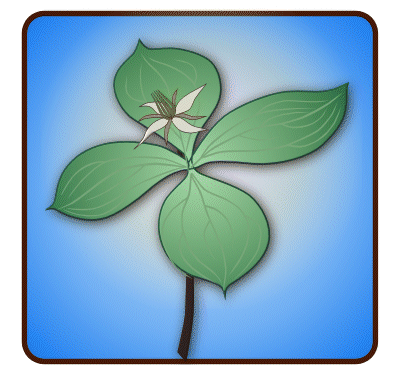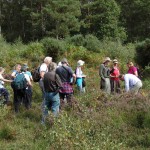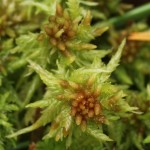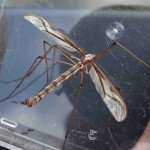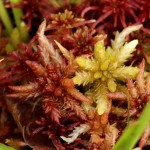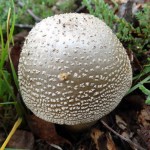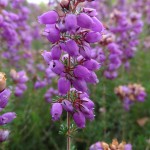Michael Keith-Lucas led a well-attended walk at Snelsmore Common on the afternoon of Sunday 7th September. The woodland around the car park contains a number of ancient woodland indicator species. One of these, a Crab Apple, had already dropped good numbers of small greenish-yellow fruit onto the surrounding woodland floor. The woods contain a surprising mixture of trees, including lime-loving Whitebeam and acid-loving Rowan. A number of fungi were seen beneath the trees, including Common Earthball, Common Yellow Russula and Amethyst Deceiver. The route led out onto the heath and down the valley into the start of the mire. At the edge was a carpet of yellow Tormentil and Marsh Pennywort, with small round green leaves. As well as the usual pink specimens, there were a few white-flowered Cross-leaved Heath plants. A Common Lizard darted into a dense patch of heather. Descending further into the mire, three different types of Sphagnum moss were identified –red Sphagnum capillifolium, pale straw-coloured S. palustre and green S. fimbriatum. A few specimens of Round-leaved Sundew were found, some with spikes of tiny white flowers. A number of small frogs were seen. Further down the valley was a particularly nutrient-poor section of the mire, fed by springs emerging from below the sandy layers of the Common. Bog Asphodel, Bog Pimpernel, Common Cotton-grass and White Beak-sedge were found here, together with two more types of Sphagnum, the red S. magellicanum and S. denticulatum. A distinctive Crane-fly was photographed and later identified as Pedicia rivosa. More species of Sphagnum were identified, bringing the total for the afternoon to ten. Michael poked a stick into a marshy pool and demonstrated that bubbles of methane were released.
Leaving the mire behind, the route climbed up onto drier ground on the side of the valley. There was some speculation as to which creature might have constructed the numerous small round holes in the sandy path. A Small Copper butterfly and two young Slow-worms were seen here. The grey-green lichen Cladonia fimbriata, with small cup-like fruits, was abundant on the ground amongst the heather. A Blusher was spotted beneath a Silver Birch at the top of the ridge. Michael pointed out the abrupt edge of the Bracken which marked the boundary between the sands of the Reading Beds and the overlying gravel. The rhizomes of the Bracken can spread easily through sandy soils, but not through gravel. Bell Heather put on a fine display at the top of the Common. There were several large hairy ginger and black Fox Moth caterpillars and Bilberry was also seen here.
Pictures by Sue White and Laurie Haseler
| RDNHS trip to Snelsmore Common, 7.9.14, led by Michael Keith-Lucas | |
| Plant species, including ferns and mosses | |
| Malus sylvestris | Crab Apple |
| Persicaria hydropiper | Water-pepper |
| Sorbus aria | Common Whitebeam |
| Sorbus aucuparia | Rowan |
| Castanea sativa | Sweet Chestnut |
| Calluna vulgaris | Heather |
| Potentilla erecta | Tormentil |
| Hydrocotyle vulgaris | Marsh Pennywort |
| Lythrum portula | Water-purslane |
| Juncus bulbosus | Bulbous Rush |
| Juncus effusus | Soft-rush |
| Juncus conglomeratus | Compact Rush |
| Juncus acutiflorus | Sharp-flowered Rush |
| Sphagnum palustre | |
| Erica tetralix | Cross-leaved Heath |
| Dactylorhiza maculata | Heath Spotted-orchid |
| Betula pendula | Silver Birch |
| Betula pubescens | Downy Birch |
| Molinia caerulea | Purple Moor-grass |
| Erica cinerea | Bell Heather |
| Drosera rotundifolia | Round-leaved Sundew |
| Blechnum spicant | Hard Fern |
| Narthecium ossifragum | Bog Asphodel |
| Eriophorum angustifolium | Common Cottongrass |
| Anagallis tenella | Bog Pimpernel |
| Sphagnum magellanicum | |
| Salix repens | Creeping Willow |
| Sphagnum capillifolium ssp rubellum | |
| Polygala serpyllifolia | Heath Milkwort |
| Sphagnum inundatum | |
| Sphagnum fimbriatum | |
| Sphagnum denticulatum | |
| Sphagnum cuspidatum | |
| Sphagnum papillosum | |
| Sphagnum subnitens | |
| Sphagnum fallax | |
| Aulacomnium palustre | |
| Juncus bufonius | Toad Rush |
| Deschampsia flexuosa | Wavy Hair-grass |
| Viola palustris | Marsh Violet |
| Pteridium aquilinum | Bracken |
| Teucrium scorodonia | Wood Sage |
| Vaccinium myrtilis | Bilberry |
| Veronica officinalis | Heath Speedwell |
| Aira praecox | Early Hair-grass |
| Agrostis tenuis | Common Bent |
| Fungi | |
| Scleroderma citrinum | Common Earthball |
| Laccaria amethystina | Amethyst Deceiver |
| Russula ochroleuca | Common Yellow Russula |
| Amanita rubescens | The Blusher |
| Vertebrates | |
| Lacerta vivipara | Common Lizard |
| Rana temporaria | Common Frog |
| Anguis fragilis | Slow-worm |
| Insects | |
| Lycaena phlaeas | Small Copper |
| Pedicia rivosa | |
| Macrothylacia rubi | Fox Moth |
List by Renée Grayer, Sue White and Jan Haseler
